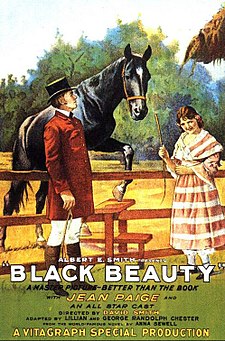※カラフル対訳で紹介している作品はすべてパブリックドメインです。
このサイトで使われている作品のすべては著作権の切れた名作などの全文を電子化して、インターネット上で公開しているProject Gutenberg(プロジェクト・グーテンベルク)、LibriVox(リブリヴォックス、朗読図書館)の作品を出典としています。
翻訳者:中務秀典
『黒馬物語』でストーリーを楽しみながら英語学習
The first place that I can well remember was a large pleasant meadow with a pond of clear water in it.
僕がよく覚えている最初の場所は、澄んだ水の池がある広々とした気持ちのよい草原[牧草地]だった。
Some shady trees leaned over it, and rushes and water-lilies grew at the deep end.
何本かの日よけの木がそこに寄りかかり、池の奥の方にはイグサやスイレンが生えていた。
Over the hedge on one side we looked into a plowed field,
片方の生け垣[垣根]の向こうには畑[耕された野原]が見え、
and on the other we looked over a gate at our master’s house, which stood by the roadside;
もう片方には門の向こう側に、道端に建つご主人様の家が見渡せた。
at the top of the meadow was a grove of fir trees, and at the bottom a running brook overhung by a steep bank.
草原[牧草地]の頂上にはモミの木立[小さい森]があり、ふもと[底]には急勾配な土手の側を流れる小川があった。[差し掛かる]
While I was young I lived upon my mother’s milk, as I could not eat grass.
幼い頃は草を食べることができなかったので、ママの乳で育った。
In the daytime I ran by her side, and at night I lay down close by her.
昼はママのそばを走り、夜はママのすぐそばに横たわった。
When it was hot we used to stand by the pond in the shade of the trees, and when it was cold we had a nice warm shed near the grove.
暑いときは池のそばの木陰に立ち、寒いときは木立の近くに暖かい小屋があった。
As soon as I was old enough to eat grass my mother used to go out to work in the daytime, and come back in the evening.
僕が草を食べられる年齢になるとすぐに、ママは昼間は仕事に出かけて夕方には帰って来るようになった。[よく~したものだ]
There were six young colts in the meadow besides me; they were older than I was; some were nearly as large as grown-up horses.
草原には僕の他にも6頭の若い仔馬がいたが、彼らは僕よりも年上で、なかには大人の馬とほぼ同じ大きさのもいた。
I used to run with them, and had great fun; we used to gallop all together round and round the field as hard as we could go.
僕は彼らと一緒に走ったものだ。そして、それはとても楽しかった。僕らはみんなで野原の周りをぐるぐると力いっぱい駆け回った。
Sometimes we had rather rough play, for they would frequently bite and kick as well as gallop.
僕たちは駆け回るのはもちろん[と同じように]、頻繁に噛【む】んだり蹴ったりなど、時にはかなり荒っぽい遊びをしていた。
One day, when there was a good deal of kicking, my mother whinnied to me to come to her, and then she said:
たくさん蹴りあいをしたある日、ママは僕に自分のところに来なさいと静かにいななき、そして言った。
“I wish you to pay attention to what I am going to say to you.
「私がこれからあなたに言うことをよく聞きなさい。[注意を払う]
The colts who live here are very good colts, but they are cart-horse colts, and of course they have not learned manners.
ここに住んでいる仔馬たちはとても良い仔馬ですが、荷馬車馬の仔馬で、もちろんマナーも学んでいません。
You have been well-bred and well-born;
あなたは育ちが良く、生まれが良い。
your father has a great name in these parts, and your grandfather won the cup two years at the Newmarket races;
あなたのお父様はこの地方で有名で、あなたのお祖父様はニューマーケット[世界最大の競馬町]の競馬で2年間優勝しました。
your grandmother had the sweetest temper of any horse I ever knew, and I think you have never seen me kick or bite.
あなたのお祖母様は、私が知っている馬の中で一番気性が優し【い】かったし、あなたも私が蹴ったり噛んだりするのを見たことがないと思うわ。
I hope you will grow up gentle and good, and never learn bad ways;
優しくていい子に育【つ】って、悪いことを学ばないようにしてね。
do your work with a good will, lift your feet up well when you trot, and never bite or kick even in play.”
思いやりの心[善意]を持って仕事をし、速足で駆けるときは足をしっかり上げ、遊ぶ時であっても決して噛んだり蹴ったりしないこと」
I have never forgotten my mother’s advice;
僕はママのアドバイスを忘れたことはありません。
I knew she was a wise old horse, and our master thought a great deal of her. Her name was Duchess, but he often called her Pet.
僕はママが賢い老馬であることを知っていたし、ご主人様もママのことを大切にし【た】てくださった。ママの名前はダッチェス[公爵夫人]でしたが、ご主人様はママのことをよくお気に入り[ペット]と呼んだ。
Our master was a good, kind man.
僕たちのご主人様は善良で親切な人だった。
He gave us good food, good lodging, and kind words; he spoke as kindly to us as he did to his little children.
ご主人様は僕たちに美味しい食事、良い宿を与えてくださり、優しい言葉をかけてくださった。彼はご自分の小さな子供たちに話すのと同じように、僕たちにも優しく話しかけてくれた。
We were all fond of him, and my mother loved him very much.
僕たちはみんなご主人様のことが好きで、ママもとても彼のことを愛していました。
When she saw him at the gate she would neigh with joy, and trot up to him.
門の前でご主人様(の姿)を見ると、ママは喜びいななき、彼のもとへと駆け寄りました。
He would pat and stroke her and say, “Well, old Pet, and how is your little Darkie?”
ご主人様はママを軽くたたいたり、やさしく撫でたりしながら 「お気に入り[ペット]ちゃん、(仔馬の)ダーキーはどうしてる?」って言う。
I was a dull black, so he called me Darkie;
僕は鈍い黒色だったので、彼は僕をダーキーと呼んだ。
then he would give me a piece of bread, which was very good, and sometimes he brought a carrot for my mother.
ご主人様は(1まとまりの)パンを私にくれた。とてもおいしかった。それから、時々ママにはニンジンを持ってきてくれた。
All the horses would come to him, but I think we were his favorites.
すべての馬がご主人様のところに行くけど、僕たちは彼のお気に入りだったと思う。
My mother always took him to the town on a market day in a light gig.
定期市の立つ日にはママはいつもご主人様を軽いギグ馬車 [一頭引き二輪馬車]で町に連れて行った。
There was a plowboy, Dick, who sometimes came into our field to pluck blackberries from the hedge.
農夫[すきをつけた牛をひく少年]のディックが、ときどき垣根からブラックベリーを摘むために僕たちの野原にやってきた。
When he had eaten all he wanted he would have what he called fun with the colts, throwing stones and sticks at them to make them gallop.
彼は食べたいものを全部食べてしまうと、彼は仔馬との戯れと称して馬に向かって石を投げ【る】たり棒を突きつけたりして、馬を駆けさせた。
We did not much mind him, for we could gallop off; but sometimes a stone would hit and hurt us.
僕たちは彼をあまり気にしなかった。駆け去ることもできたからだ。でも、時々石が当たってけがをすることがあった。
One day he was at this game, and did not know that the master was in the next field;
ある日、彼はこの遊び[ゲーム]をしていた。ご主人様が隣の野原にいることを知らずに。
but he was there, watching what was going on; over the hedge he jumped in a snap, and catching Dick by the arm,
しかし、ご主人様はそこにいて何が起きているかを見ていたんだ。すぐに生け垣を飛び越えて、ディックの腕をつかんで、
he gave him such a box on the ear as made him roar with the pain and surprise.
ご主人様はディックの横っ面をひどく張ったので、[耳への張り手]、ディックは苦痛と驚きで唸【る】った。
As soon as we saw the master we trotted up nearer to see what went on.
ご主人様を見てすぐに、僕たちは何が起こっているのかを見ようと近くに駆け寄った。
“Bad boy!” he said, “bad boy! to chase the colts.
「悪い子だ!」「悪い子だ!」とご主人様は言いながら未熟な若者[青二才]を追いかけた。
This is not the first time, nor the second, but it shall be the last.
(ディックのいたずらは)一度目でもなく、二度目でもなかった。が、これが最後となるだろう。
There—take your money and go home; I shall not want you on my farm again.”
「さあ、お金を持って家に帰るんだ。二度と俺の農場に来るんじゃない」
So we never saw Dick any more. Old Daniel, the man who looked after the horses, was just as gentle as our master, so we were well off.
そういうわけで、それ以降、僕たちはディックを見かけることはなかった。馬の世話をしていたダニエルじいさんはご主人様と同じように優しい人だった。だから僕たちは不自由なく幸せに暮らした。

